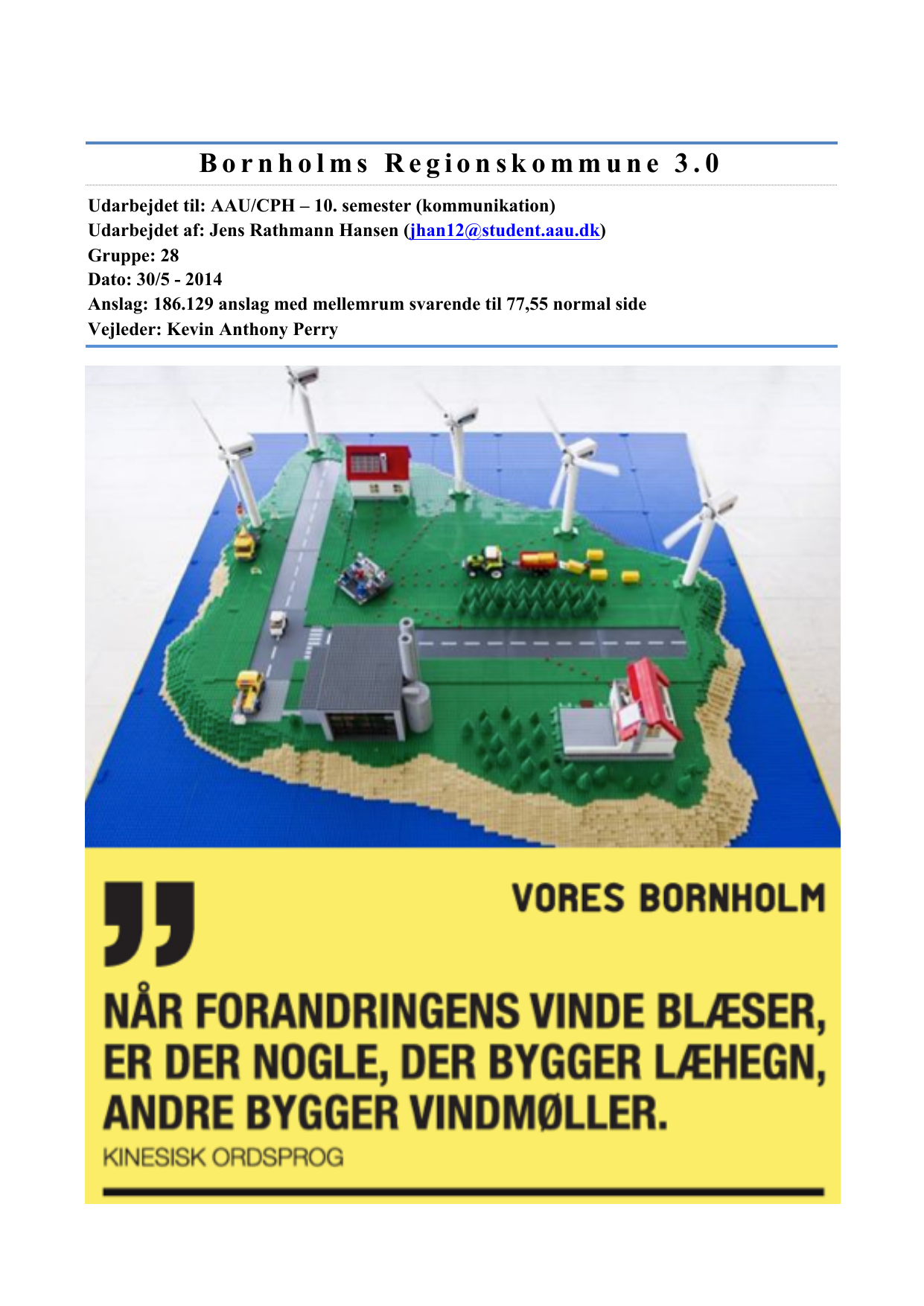
Bornholms Regionskommune 3.0
Oversat titel
Forfatter
Semester
4. semester
Uddannelse
Udgivelsesår
2014
Afleveret
2014-05-31
Antal sider
78
Abstract
Bornholms Regionskommune vil gerne ændre deres tilgang til fællesskabet mellem kommunen og øens borgere til. Den nye fællesskabstilgang som kommunen gerne vil bruge ligger i tankerne bag kommunen 3.0. Afhandlingen går ind med ustrukturerede -og semistrukturerede interview og undersøger, hvordan fællesskabet mellem Bornholms Regionskommune og dens borgere fungere pt. Og hvad der skal til i fremtiden, hvis det skal lykkes for Bornholms Regionskommune, at blive en Bornholms regionskommune 3.0.
”This is the municipality 3.0”, that was the respons from the chief executive of the municipality of Bornholm when responding to the article ”Be my guest” that introduces experience economy to the relation between the administrators and the citizens of the municipality. The chief executive was interested in the thought of fellowship and a more constructive dialogue between the municipality and its citizens which was what the article was suggesting. But what is a municipality 3.0? And what does the municipality of Bornholm need to live up to to become a municipality 3.0? These where the questions that appeared and generated the following problem. Problem description How does the region of Bornholm ensure a communicative fellowship with each citizen of Bornholm in relation to living up to the ambition of being a municipality 3.0? Method The methodological approach is influenced by a pre-understanding of how the systems of the municipality 3.0 and a local community co-exist. To handle the pre-understanding and use it proactively, hermeneutics will form the ontological frame of the thesis. The hermeneutics cover a wide variety of different traditions, theories, methods etc. These share two basic considerations: Understanding and interpretation come before explanation. The social phenomena and actors that are being studied are carriers of connections of meanings and opinions. It is these connections that are to be interpreted and laid out scientifically (Fuglsang 2004). The empirical approach will be made on the basis of Kvale’s (1997) seven stages of interview research. Theory There will be an introductory sub-chapter on the term ”fellowship”. Thereafter the following five categories will decide the selected theories: From five municipalities to one, Citizen service, Becoming digital, Voluntariness and Citizen panel. The categories emerged from the unstructured process of interviews (Glaser og Strauss 1967). Conclusion Bornholm has possibilities of becoming a municipality 3.0 in the form of an engaged citizen panel and culture of voluntariness. However, factors such as economy, centralization and becoming digital challenge the feeling of fellowship among the citizens. Becoming digital offers possibilities in relation to netbased fellowships. However, establishing such fellowships demand a greater effort than the municipality has delivered so far. The thesis suggests that a transverse communication unit that works both internally and externally might develop the communication of the municipality in a direction that can develop the sense of fellowship between the municipality and its citizens and allow the municipality to approach being a municipality 3.0. The municipality needs to go ”all-in” if it wants to succeed in becoming a municipality 3.0.
Emneord
